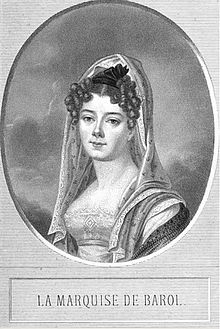Juliette Colbert
Juliette Victoria Françoise Colbert di Maulévrier , married Giulia Falletti di Barolo (born June 27, 1785 or 1786 in Maulévrier ; † January 19 or February 18, 1864 in Turin ) was a French philanthropist and Italian margravine , who because of her piety and her social Engagement is one of the so-called Turin social saints .
Life
Juliette Colbert came from a noble family in the Catholic Vendée . Her father was Edouard Victurnien Charles René Colbert, her mother Anne Marie Louise de Crénolle. She was thus a direct descendant of Jean Baptiste Colbert , the Sun King's finance minister. When she was seven years old, her mother died. During the turmoil of the revolution, she and her family fled first to Germany, then to Holland. After Napoleon came to power , she returned to France.
On August 18, 1806, she married the Italian Margrave Carlo Tancredi Falletti di Barolo in Paris . In 1814 the two moved to the Palazzo Barolo in Turin . In Turin she was involved in charity from the start . She especially helped the prisoners, poor girls and young mothers. Together with her husband, she created several free schools (the first in Borgo Dora in 1821 ), founded the Istituto del Rifugio for young mothers in 1823 and used part of the Palazzo Barolo as Asilo Barolo for working-class children from 1825 . In 1833 they founded a monastery next to the Istituto del Rifugio to take in the victims of child prostitution. In 1834 they established the order of the Suore di Sant'Anna . Her husband died in 1838 as a result of the cholera epidemic of 1835.
From that year until his death in 1854 , Silvio Pellico worked as librarian and secretary to the margravine. She donated an annual pension to him and arranged for the French translation of his works. It seems to have been Pellico who in 1844 recommended the Margravine to appoint her young priest friend Johannes Bosco as chaplain of the chapel of St. Bring Franz von Sales to her institute. He worked there until he founded his own work in Valdocco in 1846.
In 1845 she opened the Hospital of St. Filomena for disabled children, a vocational school for working-class girls in 1847 near the Palazzo Barolo. A weaving and embroidery school followed in 1857.
On the basis of her will, the Opera Pia Barolo was established after her death , which was to continue the works of Giulia di Barolo and her husband with the inheritance.
In 1864 she died in Turin; her remains have been in the church of Santa Giulia (Turin) in the Vanchiglia district since 1899 , which she herself commissioned.
See also Colbert House
beatification
On January 21, 1991, the beatification process began. In May 2015, she was from Pope Francis for venerable explained.
Web links
- Biography on santiebeati.it (Italian)
- Biography on museotorino.it (English)
literature
- Silvio Pellico, La Marchesa Giulia Falletti di Barolo, nata Colbert - Memorie di Silvio Pellico , Turin 1864 (memories of the writer who died in 1854)
- Ave Tago, Giulia Colbert Marchesa di Barolo, Congregazione Figlie di Gesù Buon Pastore , Milan (2) 1994
- Giuseppe Tuninetti, Santi, beati e venerabili piemontesi , Turin 1999
- Giovanni Zavatti, Vita di Silvio Pellico e di Julietta Colbert, marchesa di Barolo , Milan 2004 - ISBN 88-86792-90-5
- Congregazione Figlie di Gesù Buon Pastore, Giulia Colbert di Barolo. Madre dei Poveri. Biographical documentation , ed. by Suor Ave Tago, Vatican City 2007
Individual evidence
- ↑ a b Antonius Lux (ed.): Great women of world history. 1000 biographies in words and pictures . Sebastian Lux Verlag , Munich 1963, p. 39.
- ^ Ricordo di Silvio Pellico. In: Pregando.it. Archived from the original on September 6, 2012 ; accessed on August 27, 2019 (Italian).
- ↑ Laura Fezia: Alla scoperta dei segreti perduti di Torino . Newton Compton editori, Rome 2016, ISBN 978-88-541-9967-5 .
| personal data | |
|---|---|
| SURNAME | Colbert, Juliette |
| ALTERNATIVE NAMES | Colbert di Maulévrier, Juliette Victoria Françoise (full name); Barolo, Giulia Falletti di |
| BRIEF DESCRIPTION | French philanthropist and Italian margravine |
| DATE OF BIRTH | June 27, 1785 or 1786 |
| PLACE OF BIRTH | Maulevrier |
| DATE OF DEATH | January 19, 1864 or February 18, 1864 |
| Place of death | Turin |
